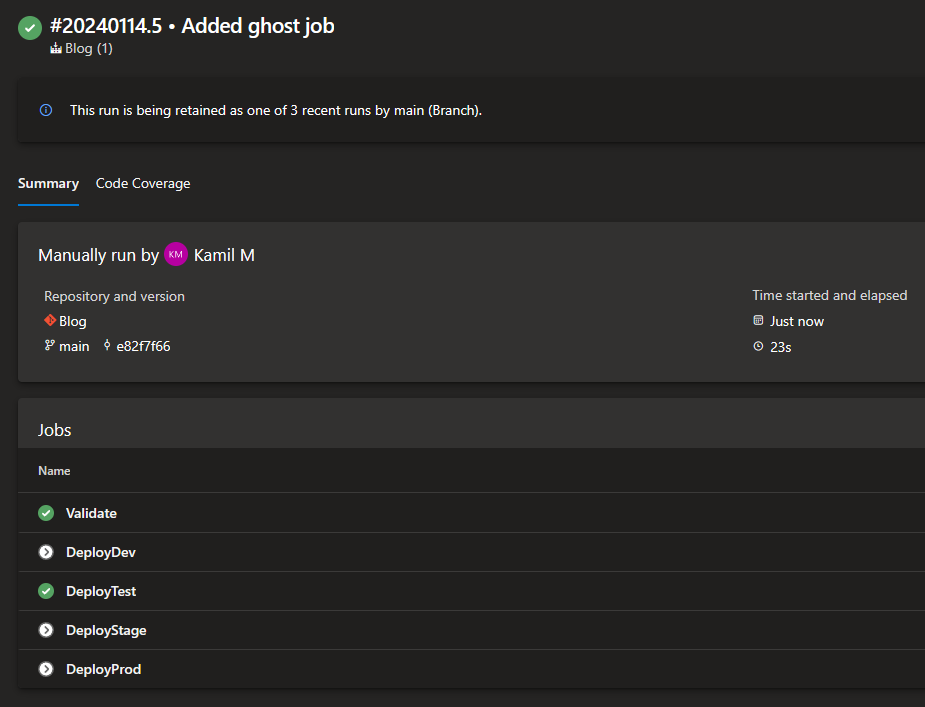Handling default parameter value in Azure DevOps
When building YAML pipeline, Azure DevOps allows you to provide a set of input parameters. Those parameters are useful when you want to customize logic inside a pipeline. Think about running different stages, jobs and steps depending on the values provided by a user when scheduling a run. There’s one gotcha here - currently, Azure DevOps disallows you from configuring optional parameters. This means, that you either always provide a value, or find another way of seeding a run (e.g. using variable groups). In this article, we’ll discuss how one can use default values of parameters, so they are meaningful and can be used as a method to skip certain fragments of a pipeline.
Building a pipeline
For the reference for this article, let’s start with the following pipeline:
trigger: none
pool:
vmImage: ubuntu-latest
parameters:
- name: environment
displayName: 'Environment'
values:
- dev
- test
- stage
- prod
jobs:
- job: Validate
steps:
- script: 'echo "Validating things..."'
- job: DeployDev
steps:
- script: 'echo "Deploying DEV..."'
- job: DeployTest
steps:
- script: 'echo "Deploying TEST..."'
- job: DeployStage
steps:
- script: 'echo "Deploying STAGE..."'
- job: DeployProd
steps:
- script: 'echo "Deploying PROD..."'
This pipeline has 5 jobs - one, which could run some kind of validation scripts, and 4 jobs, which are responsible for deployment of changes to selected environment. To allow a user to select a desired environment, we also configured environment parameter. Such parameter is then available in UI when starting a run of the pipeline:
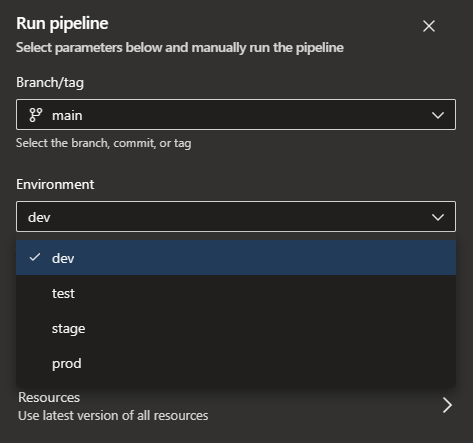
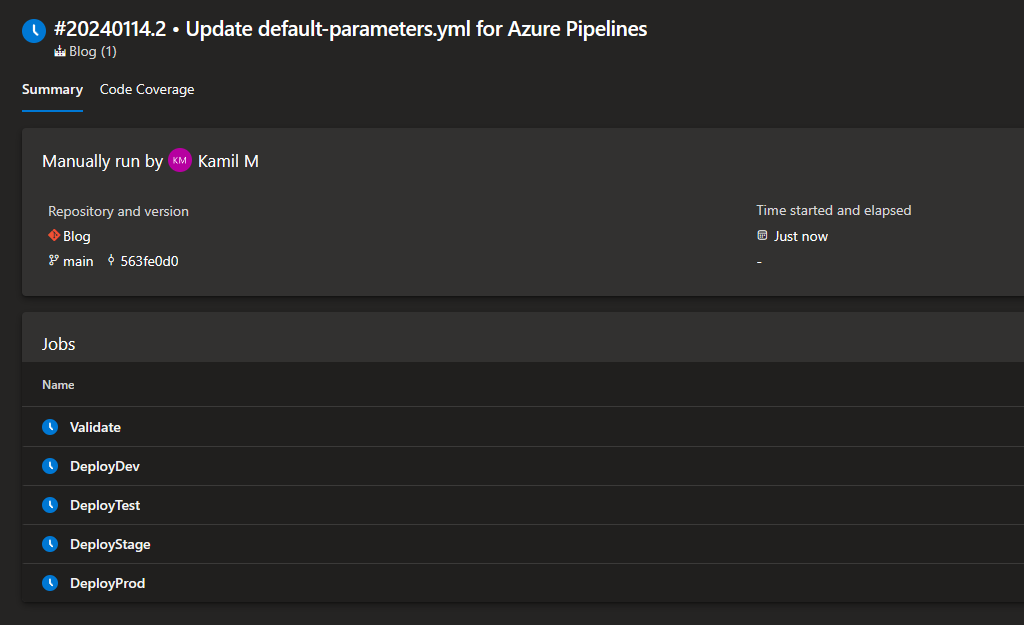
Using conditions
Azure DevOps has a feature called conditions, which allow us to decide when a certain pipeline section is supposed to run. In general, syntax for a condition looks like this:
condition: and(succeeded(), eq(variables.isMain, true))
In the above example, a condition is based on a and() logical function, which is true only of two passed values evaluate to true. To explain the example even more - it will return true only if:
- previous dependency (like job, step, stage) succeeded (hence
succeeded()) - value of
isMainvariable is set totrue
We understand the conditions a bit better now - it’s time to use them in our pipeline. As in our condition we’d like to use a parameter, we need to implement slightly different syntax:
trigger: none
pool:
vmImage: ubuntu-latest
parameters:
- name: environment
displayName: 'Environment'
values:
- dev
- test
- stage
- prod
jobs:
- job: Validate
steps:
- script: 'echo "Validating things..."'
- job: DeployDev
condition: ${{ eq(parameters.environment, 'dev') }}
steps:
- script: 'echo "Deploying DEV..."'
- job: DeployTest
condition: ${{ eq(parameters.environment, 'test') }}
steps:
- script: 'echo "Deploying TEST..."'
- job: DeployStage
condition: ${{ eq(parameters.environment, 'stage') }}
steps:
- script: 'echo "Deploying STAGE..."'
- job: DeployProd
condition: ${{ eq(parameters.environment, 'prod') }}
steps:
- script: 'echo "Deploying PROD..."'
From now on, every time we select a desired environment, deployment should happen only for a single job. Here’s an example when choosing dev as the value of our parameter:
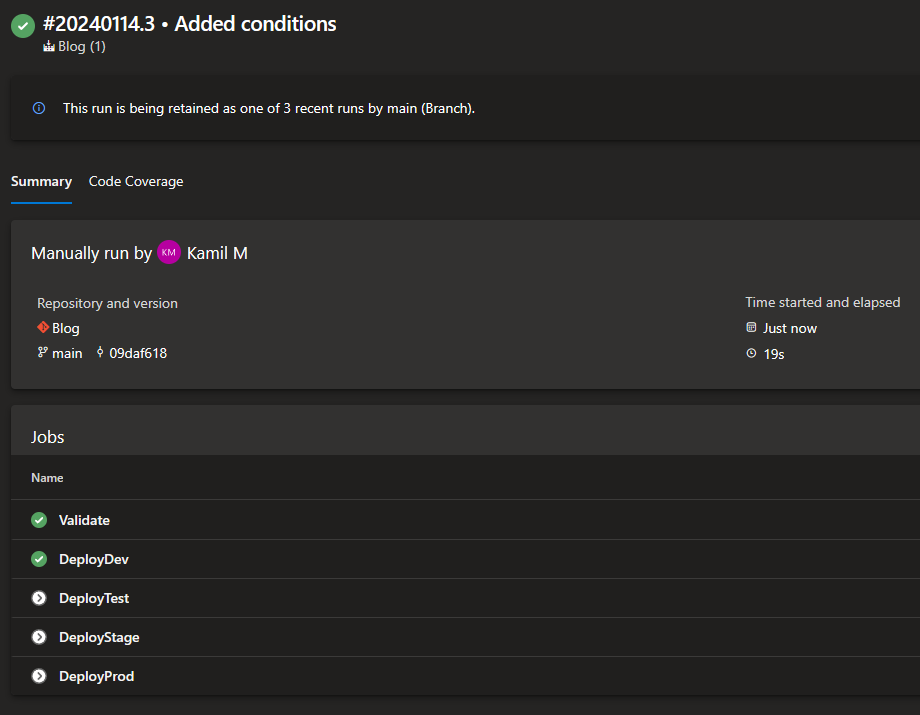
Validate alone. Doing so seems like a neat idea, especially for quick tests whether our changes have a chance to be deployed successfully. Let’s try to implement an improvement.
Adding a new value
The initial idea to solve the problem with the Validate job is adding one more value to the parameter:
parameters:
- name: environment
displayName: 'Environment'
values:
- validate
- dev
- test
- stage
- prod
Now, with a small change to our pipeline, we could make sure, that the job can be run alone:
jobs:
- job: Validate
condition: ${{ eq(parameters.environment, 'validate') }}
steps:
- script: 'echo "Validating things..."'
Such change will work just fine, but once again there’s a problem - we’re unable to run both Validate jobs and any of the deployment jobs since now there’s a strict condition, which blocks other jobs. The question is - how could we configure the pipeline, so we can run both Validate job in isolation, but also let it run as a preflight validation for any other job in the pipeline?
Creating a ghost job
To fix our issue, we can introduce something, which I call a ghost job. In short, it’s a simple concept, where a job inside a pipeline implicitly depends on a provided input, so it can run in isolation or with other jobs, even though the input value is not passed explicitly. Let’s check the following example:
trigger: none
pool:
vmImage: ubuntu-latest
parameters:
- name: environment
displayName: 'Environment'
default: validate-only
values:
- validate-only
- dev
- test
- stage
- prod
jobs:
- job: Validate
steps:
- script: 'echo "Validating things..."'
- job: DeployDev
condition: ${{ eq(parameters.environment, 'dev') }}
steps:
- script: 'echo "Deploying DEV..."'
- job: DeployTest
condition: ${{ eq(parameters.environment, 'test') }}
steps:
- script: 'echo "Deploying TEST..."'
- job: DeployStage
condition: ${{ eq(parameters.environment, 'stage') }}
steps:
- script: 'echo "Deploying STAGE..."'
- job: DeployProd
condition: ${{ eq(parameters.environment, 'prod') }}
steps:
- script: 'echo "Deploying PROD..."'
As you can see, I got rid of condition in our Validate job. I also added new value for the environment parameter called validate-only and made it the default value. Now, if you just run the pipeline without selecting an environment, it’ll run the Validate job only:
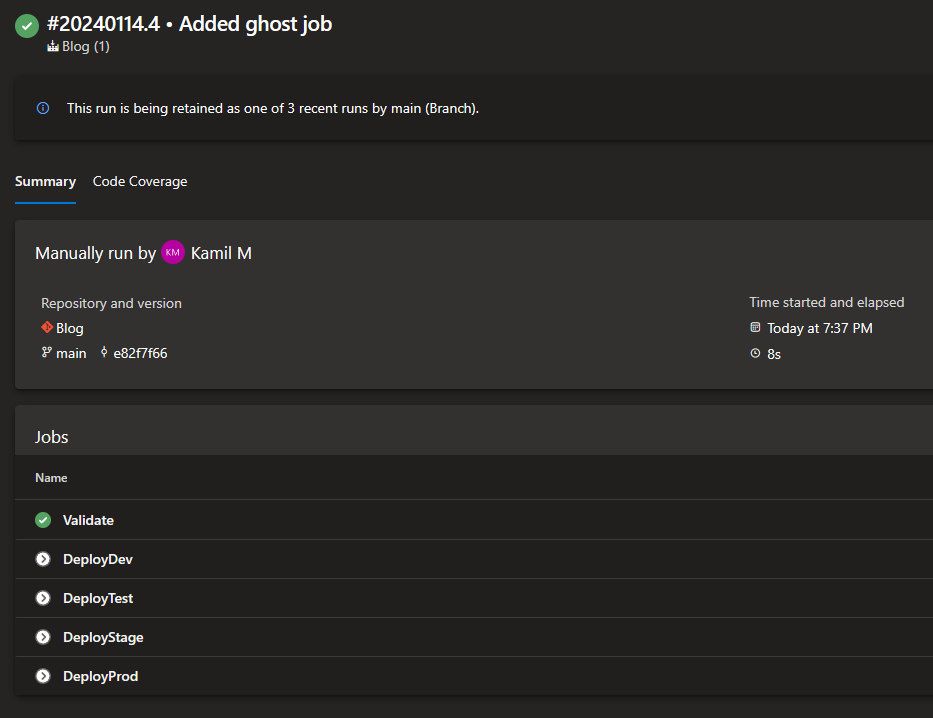
Validate job and one of the deployment jobs. Here’s example when test was selected:
